Bonnie and Clyde, Roger Ebert, and Pauline Kael
Posted on August 13, 2017 at 3:37 pm
Arthur Penn’s “Bonnie and Clyde” turns 50 this week. Rogerebert.com critics pay tribute, fitting as the film was one of Roger Ebert’s favorites and his review of the film helped to make his reputation as a critic of seriousness, insight, and influence. He wisely and accurately wrote at the time that the film was “a milestone in the history of American movies, a work of truth and brilliance” and predicted “years from now it is quite possible that ‘Bonnie and Clyde’ will be seen as the definitive film of the 1960s.” Later, with some perspective, he included it as one of his “Great Films” and wrote, “It was a film in which all of the unlikely pieces were assembled at the right time. And more than anything else, it was a masterpiece of tone, in which the actors and filmmakers were all in sync as they moved the material back and forth between comedy and tragedy.”

At Flavorwire, Jason Bailey writes about Pauline Kael’s review, which he says was “as revolutionary to the craft of film criticism as Bonnie and Clyde was to the craft of film.”
“Bonnie and Clyde is the most excitingly American American movie since The Manchurian Candidate,” she wrote. “The audience is alive to it. Our experience as we watch it has some connection with the way we reacted to movies in childhood: with how we came to love them and to feel they were ours—not an art that we learned over the years to appreciate but simply and immediately ours.” And with that, she’s off and running, not only drawing us in with the breathless urgency of her praise, but vibing on what would become one of her signature preoccupations: the wild notion that this commoner’s entertainment could also be considered art, even when functioning outside the rigid confines of the “art film.”
She tackles this idea sideways, in considering and refuting the key argument of the film’s detractors (chief among them, Crowther at the Times): its violence. “To ask why people react so angrily to the best movies and have so little negative reaction to poor ones is to imply that they are so unused to the experience of art in movies that they fight it,” she surmises, and expands upon that notion thus:
Though we may dismiss the attacks with “What good movie doesn’t give some offense?,” the fact that it is generally only good movies that provoke attacks by many people suggests that the innocuousness of most of our movies is accepted with such complacence that when an American movie reaches people, when it makes them react, some of them think there must be something the matter with it—perhaps a law should be passed against it.
These were fairly radical notions at the time (for an American critic, anyway), that a popular art form like film should not only be provocative, but was better for it – and at the very least, it was a radical idea for the tony pages of the New Yorker. But the film’s volatile relationship with its audience, how it turns our expectations and reactions (to violence, to sexuality, and especially to humor) back on its viewers, make for both the essay’s most compelling ideas, and its most astonishing writing.
Also of interest: Variety’s Steven Gaydos debunks the myth that Kael’s review saved the film from studio neglect.
